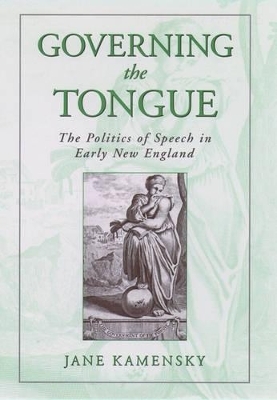
Governing The Tongue
The Politics of Speech in Early New England
Seiten
1999
Oxford University Press Inc (Verlag)
978-0-19-513090-4 (ISBN)
Oxford University Press Inc (Verlag)
978-0-19-513090-4 (ISBN)
Explaining why the spoken word assumed such importance in the culture of early New England, the author re-examines such famous Puritan events as the Salem witch trials and the banishment of Anne Hutchinson to expose the ever-present fear of what the puritans called "sins of the tongue."
Colonial New Englanders would have found our modern notions of free speech very strange indeed. Children today shrug off harsh words by chanting "sticks and stones may break my bones but names will never hurt me," but in the seventeenth century people felt differently. "A soft tongue breaketh the bone," they often said.
Governing the Tongue explains why the spoken word assumed such importance in the culture of early New England. Author Jane Kamensky re-examines such famous Puritan events as the Salem witch trials and the banishment of Anne Hutchinson to expose the ever-present fear of what the puritans called "sins of the tongue." But even while dangerous or deviant speech was restricted, Kamensky points out, godly speech was continuously praised and promoted. Congregations were told that one should ones voice "like a trumpet" to God and "cry out and cease not."
By placing speech at the heart of familiar stories of Puritan New England, Kamensky develops new ideas about the relationship between speech and power both in Puritan New England and, by extension, in our world today.
Colonial New Englanders would have found our modern notions of free speech very strange indeed. Children today shrug off harsh words by chanting "sticks and stones may break my bones but names will never hurt me," but in the seventeenth century people felt differently. "A soft tongue breaketh the bone," they often said.
Governing the Tongue explains why the spoken word assumed such importance in the culture of early New England. Author Jane Kamensky re-examines such famous Puritan events as the Salem witch trials and the banishment of Anne Hutchinson to expose the ever-present fear of what the puritans called "sins of the tongue." But even while dangerous or deviant speech was restricted, Kamensky points out, godly speech was continuously praised and promoted. Congregations were told that one should ones voice "like a trumpet" to God and "cry out and cease not."
By placing speech at the heart of familiar stories of Puritan New England, Kamensky develops new ideas about the relationship between speech and power both in Puritan New England and, by extension, in our world today.
Jane Kamensky is Assistant Professor of American History at Brandeis University and author of The Colonial Mosaic: American Women, 1600-1760 (OUP, 1995).
Introduction
1: The Sweetest Meat, the Bitterest Poison
2: A Most Unquiet Hiding Place
3: The Misgovernment of Woman's Tongue
4: "Publick Fathers" and Cursing Sons
5: Saying and Unsaying
6: The Tongue is a Witch
Epilogue
Appendix: Litigation over Speech in Massachusetts, 1630-1692
| Erscheint lt. Verlag | 29.4.1999 |
|---|---|
| Verlagsort | New York |
| Sprache | englisch |
| Maße | 235 x 155 mm |
| Gewicht | 408 g |
| Themenwelt | Geschichte ► Allgemeine Geschichte ► Neuzeit (bis 1918) |
| Geisteswissenschaften ► Geschichte ► Regional- / Ländergeschichte | |
| Geisteswissenschaften ► Philosophie ► Sprachphilosophie | |
| Geisteswissenschaften ► Religion / Theologie ► Christentum | |
| Geisteswissenschaften ► Sprach- / Literaturwissenschaft ► Sprachwissenschaft | |
| ISBN-10 | 0-19-513090-1 / 0195130901 |
| ISBN-13 | 978-0-19-513090-4 / 9780195130904 |
| Zustand | Neuware |
| Informationen gemäß Produktsicherheitsverordnung (GPSR) | |
| Haben Sie eine Frage zum Produkt? |
Mehr entdecken
aus dem Bereich
aus dem Bereich
Giordano Bruno - ein ketzerisches Leben
Buch | Hardcover (2024)
C.H.Beck (Verlag)
CHF 41,85


